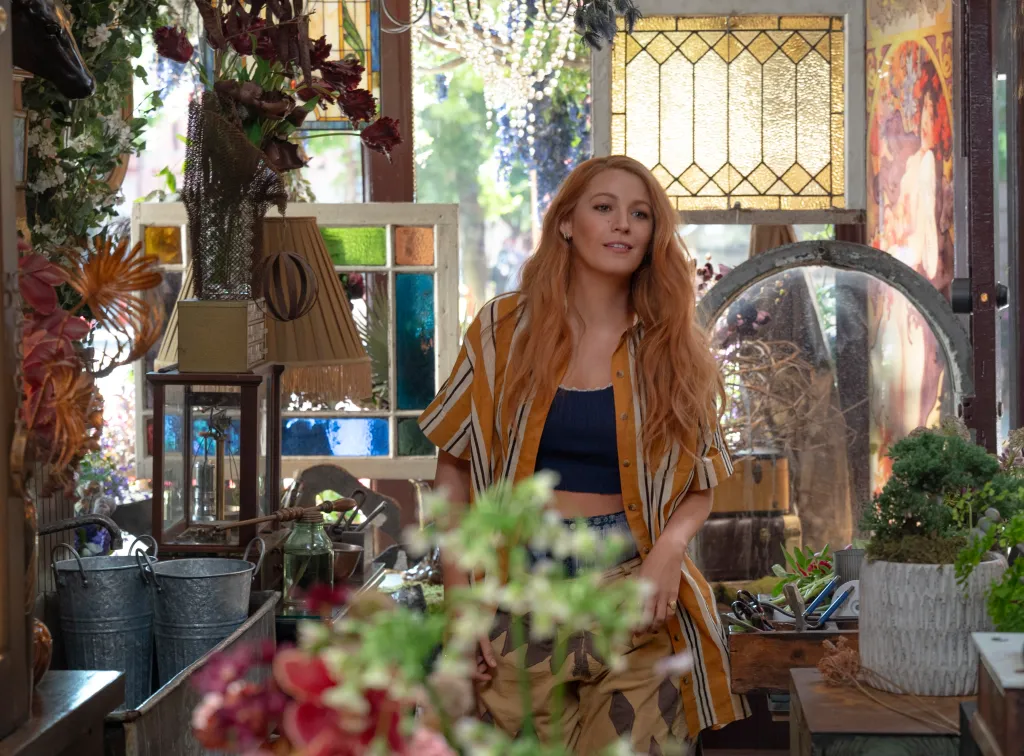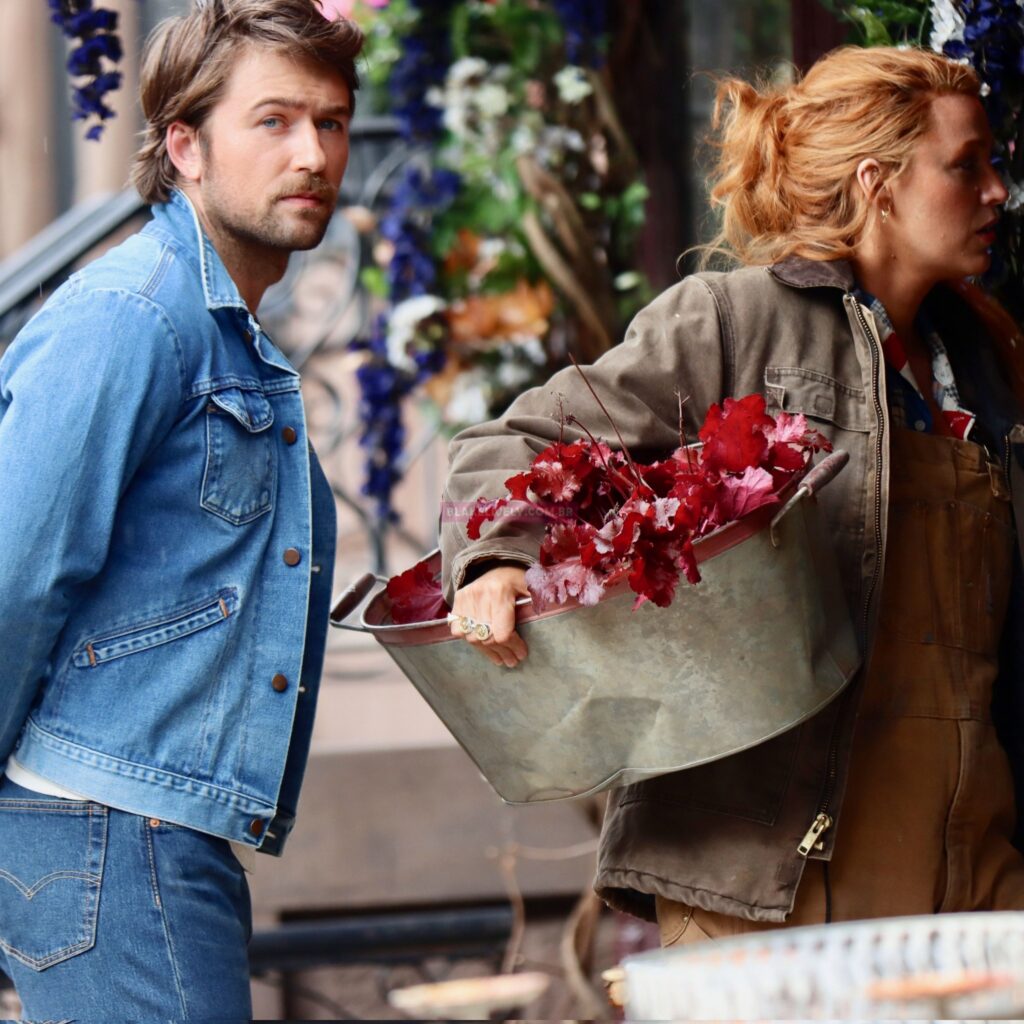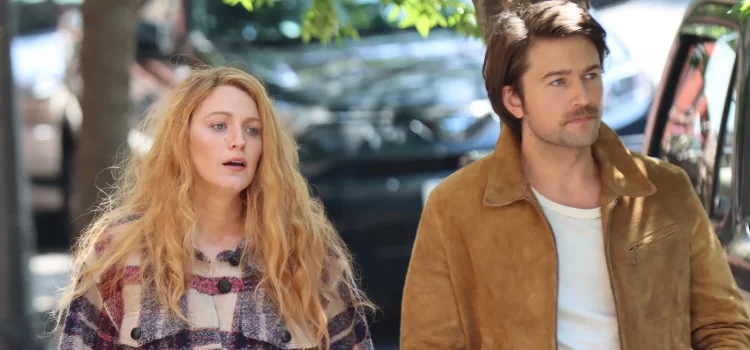By Lynn Venhaus
An important message about domestic violence in “It Ends with Us” is diluted by the film adaptation’s shallow, superficial trappings that favor a glossy lifestyle magazine approach to a serious issue.
Based on Colleen Hoover’s 2016 bestselling romance novel, this is the story of Lily Bloom (Blake Lively) who opens her dream floral shop in Boston. She marries the brother of her best friend Allysa (Jenny Slate), a handsome neurosurgeon Ryle Kincaid (Justin Baldoni, who also directed).
But she is reminded of her father’s abusive treatment of her mother when her controlling husband’s jealousy escalates. She becomes a victim herself once her first love, Atlas Corrigan (Brandon Sklenar), reappears. She has tough decisions to make about her future.
Hoover’s bestselling novel has been faithfully adapted by screenwriter Christy Hall, according to people who’ve read the novel (a book club favorite), but the contrived cookie-cutter romance lacks any whiff of authenticity. Oh, the movie characters have been aged as compared to the book — Lily was 23 and Ryle 30, and the actors are 35 and 39 in real life.
The illogical soap opera unfolds with flashbacks to Lily’s childhood, where she befriends Atlas, a fellow high school student down on his luck. Their younger selves are convincingly portrayed by Alex Neustaedter, who was in the Jeff Daniels’ series “American Rust,” and a striking naturalistic Isabela Ferrer.
Despite gauzy impressionistic snapshots, they swiftly establish a believable connection that continues in the adult portrayals of Lily by Blake Lively and Atlas by Brandon Sklenar. Their genuineness sharply contrasts with the adult Lily-Ryle relationship that feels too forced, straining credibility.
While limited in their acting ranges, Lively and Baldoni are very attractive people, but the film’s poor editing choices rely too much on repetitive close-ups. Their rapid courtship, which shouldn’t involve this much eye-rolling, mostly focuses on their mannequin physiques.

When that pairing quickly erodes once they marry, the obvious red flags make any feelings seem manufactured between the supermodel-looking couple.
Baldoni, who also directed, played Rafael for five seasons on the TV series “Jane the Virgin,” and directed the high-concept romantic drama “Five Feet Apart” in 2019.
Without spoiling character development, his inability to emote other than steamy kissy-face scenes result in improbable actions and silly scenarios as the hotshot doctor. The shot selection opts for a designer cologne commercial look, which makes it difficult to relate to the main characters in any sincere way.
When the choppy, clumsy storytelling finally zeroes in on the truth-revealing conflicts, the reliance on quick-cut violent outbursts lessens the impact of what they are trying to achieve.
Because physical abuse is mostly implied than pictured (except for one harrowing but badly executed and confusing scene), Lively’s minimal facial injuries are easily covered up by make-up.
By barely resembling honest situations, the film drops the ball on what should have been motivating advocacy.
Quirky Jenny Slate is appealing as offbeat Allysa, who starts as Lily’s employee but becomes her best friend and trusted advisor. She seems to be tasked with the heavy lifting. Her character’s devoted husband Marshall is humorously played by Hasan Minhaj of “The Daily Show,” but he’s primarily a vehicle for comic relief.
The flimsy character development is a hindrance for Sklenar as Atlas, who now, after serving eight years in the Marines, is a renowned chef with his own hit farm-to-table restaurant, Root. It’s the hotspot in Boston, which drives Ryle over the edge.
Pegged to be the knight in shining armor, Sklenar, who played Spencer Dutton in the “Yellowstone” prequel “1923,” is reduced to long, loving, piercing gazes at Lively. And he’s used awkwardly.

The revered character actress Amy Morton’s lack of identity regarding Lily’s mom Jenny wastes her talent and whatever meaningful voice the character could have contributed as a victim who chose to stay.
Costume Designer Eric Daman, who worked with Lively on TV’s “Gossip Girl,” has chosen puzzling lumberjack-style outfits that seem odd choices for Lively, although he occasionally pulls out all the stops for dazzling party attire and stylish shoes (that seem very out of budget for the fledgling florist, but he did work on “Sex and the City” and we know how reckless Carrie was with the money spent on designer shoes). The baggy ensembles look odd when Lively walks down busy streets.
“It Ends with Us” could have shed more light on signs of domestic abuse, behavioral patterns to recognize, and ways to get help, other than a mere tagline in the credits while some overwrought pop song plays.
That was a missed opportunity, in favor of a Lifetime-quality movie with shiny pretty people making its only point that affluent, well-educated adults can hide destructive secrets.
One line delivered feebly: “I can get help” isn’t followed with any action, so any serious intentions to raise awareness are abandoned, which is unfortunate.
With its triggering scenes treated so cavalierly, the effort’s inept approach diminishes its effectiveness, and turns out to be an exasperating waste of time.
“It Ends With Us” is a 2024 romantic drama directed by Justin Baldoni and starring Baldoni, Blake Lively, Brandon Sklenar, Jenny Slate, Isabela Ferrer, Amy Morton, Alex Neustaedter and Hasan Minhaj. The film is rated PG-13 for domestic violence, sexual content and some strong language,.and the runtime is 2 hours, 10 minutes. The film opened in theatres on Aug. 9. Lynn’s Grade: D+.


Lynn (Zipfel) Venhaus has had a continuous byline in St. Louis metro region publications since 1978. She writes features and news for Belleville News-Democrat and contributes to St. Louis magazine and other publications.
She is a Rotten Tomatoes-approved film critic, currently reviews films for Webster-Kirkwood Times and KTRS Radio, covers entertainment for PopLifeSTL.com and co-hosts podcast PopLifeSTL.com…Presents.
She is a member of Critics Choice Association, where she serves on the women’s and marketing committees; Alliance of Women Film Journalists; and on the board of the St. Louis Film Critics Association. She is a founding and board member of the St. Louis Theater Circle.
She is retired from teaching journalism/media as an adjunct college instructor.

